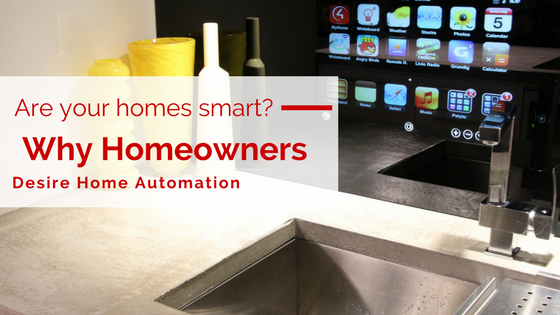Technology. We can’t escape it, so we might as well embrace it. But the terms are sometimes confusing. What’s the difference between cost and energy-saving devices and the technology that makes everyday living easier and more enjoyable? If many systems in your home can be programmed — like the thermostat or the yard sprinkler — to do what you want them to do when you want them to do it, are they smart?
Does it matter?
In terms of adapting your living space to the new world, it matters. If you are building new or adding modern-day capabilities to an existing home, it pays to have a working knowledge of what’s available in terms of home automation and, alternately, smart home technology. They can be similar, but when you connect them to one another and make it possible to send signals that control varied operations from afar — now that is truly “smart.”
Home Automation
Automated systems have been around for a long time and they have done an admirable job preparing most homeowners for the advent of smart technology. Until fairly recently, home automation was considered advanced technology. It altered the worlds of lighting design, temperature control, landscape maintenance, dinner preparation (turning an oven on or off based on a pre-set schedule), television viewing, and home security. Today, all of that is old hat.
The interconnectedness of things, however, is a new concept. And systems that are interconnected and that can be monitored and controlled remotely, whether from across the street or across the globe — that’s smart!
Is Your Home Smart?
A survey of more than 4,000 homeowners found that 2016 was the year that smart technology, in effect, became mainstream. The study found that almost half of American homeowners either already owned smart home technology or planned to invest in it before the end of the year. More than half of those surveyed said they would invest in smart home improvements prior to selling a home, convinced that buyers would pay a premium for the technology.
Smart home technology is, in effect, the controller of all things automated in the home. It’s the concept that allows your devices and your systems to communicate with one another, and with you, whether you’re home or not.
If this is confusing, think of it this way: The way specific things can be made to operate automatically is just a single aspect of a smart home. The “brain power” that makes it happen is what makes it “smart.”
Taking the Next Step
If you appreciate what your smart phone and your computer can do to simplify your life, help you with scheduling and communication and keep you in touch with family and friends, you will love what smart technology can do around the house. And it’s not even necessary to understand how all the pieces fit together. Aterra has prepared a Cheat Sheet to help you navigate the landscape of automation and smart technology. At the very least, it will introduce you to the lingo, so that you can communicate with those in the know about what you want and need.
We are those experts; but even we learn new things daily because the technology that was cutting edge last year is “ho-hum” today. If you’re building or buying, you really can’t afford to be behind the times. Not only will you miss out on a lot of the fun, but it could be a costly mistake in terms of your home’s value.
So, get smart and go smart in your new home. We at Aterra stand ready to help you make it work!


